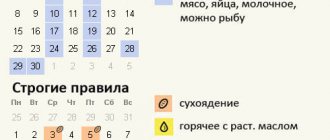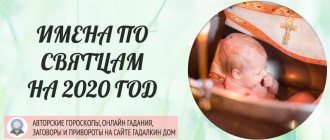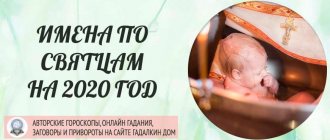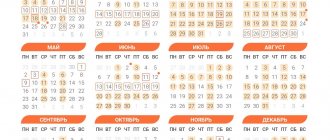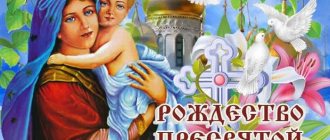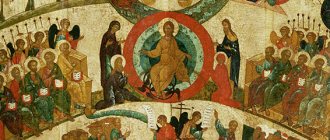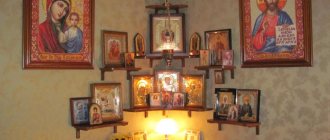Memory of the Great Martyr Theodore Tiron - March 12
The warrior Theodore (“Tiron” literally means new recruit) is a great martyr, whose memory is celebrated on Saturday of the first week of Lent.
He lived in the 3rd century during the reign of Emperor Maximilian. Because Theodore refused to make a sacrifice to the pagan gods and declared himself a Christian, the warrior was thrown into prison, severely tortured and, ultimately, burned at the stake. According to legend, the fire did not damage his remains. The Christian Eusevia took them and kept them in her house. Later the relics of the saint were transferred to Constantinople.
On the eve of the day of remembrance of St. Theodore Tyrone, on Friday, after the Liturgy of the Presanctified Gifts, the canon of the Great Martyr Theodore is read in churches and kolivo (boiled grains of wheat with honey) is distributed to parishioners. This is done in memory of one amazing event. The fact is that in the 4th century, Emperor Julian the Apostate came to power in Constantinople. He oppressed Christians in many ways. One day, during the first week of Great Lent, he ordered that blood sacrificed to idols be secretly sprinkled on all the products that were sold in the city. The following night, the Great Martyr Theodore appeared to the local archbishop in a dream and told about the machinations of the emperor. The martyr commanded Christians not to buy food sacrificed to idols, but to cook kolivo from home grain reserves.
January
<<
| ||||||||
| Mon | W | Wed | Thu | Fri | Sat | Sun | ||
Christmas post
The year begins with the Nativity Fast, which will last until January 6 inclusive.
Fast days in January - from the 1st to the 6th, 18th (Epiphany Eve), 21st, 26th, 28th.
All holidays in January fall on Wednesdays and Fridays (Christmas and the Circumcision of the Lord - on Friday, Epiphany - on Wednesday). Therefore, there is no fasting on these Wednesdays and Fridays.
For the laity, it is recommended to observe a stricter fast on January 5, 6, 18. And on the 1st, 2nd, 3rd, 4th, 21st, 26th, 28th, fish dishes are allowed.
Dry eating for those observing a strict version of fasting is prescribed on January 3, 5 and 6.
Week 1 of Lent. Triumph of Orthodoxy - March 13
In Church Slavonic, “week” means “Sunday,” and week in the modern sense of the word is called “week.” Every Sunday in Lent has a special dedication.
The first Sunday of Great Sunday is called the Triumph of Orthodoxy in honor of an event that took place in 843 in Constantinople. Then Queen Theodora gathered the hierarchs of the Church who approved of icon veneration and deposed the iconoclastic Patriarch John the Grammar. This is how the decisions of the VII Ecumenical Council were implemented, which decided to venerate holy icons.
They decided to make this holiday annual to remind people of the danger of falling into heresy. The Triumph of Orthodoxy is celebrated on the first Sunday of Lent, since its very first celebration in 843 fell on precisely such a day. The texts of the rite of the Triumph of Orthodoxy speak of the victory of the Church over heresies and proclaim the decisions of the seven Ecumenical Councils.
Features of the Orthodox calendar
Orthodoxy has its own culture and history. Believers honor traditions and, according to culture, celebrate certain days and spend them in a special way.
On holidays it is allowed:
- Don't limit yourself in food.
- Work less or stop working altogether.
- Conduct holiday services in the church.
The main feature of the calendar of Orthodox holidays is the presence in it of solemn events that do not change the dates.
And also those that are held on a new day every year. That is, the date of their holding changes. Conventionally, holidays can be classified as follows:
| Movable: | The timings vary depending on the date of Easter. |
| Fixed: | The date does not change; every year the holidays fall on the same day. |
In the world culture of Orthodoxy, it is customary to celebrate church holidays in different ways; people close to religion visit churches and often organize feasts, inviting family and friends. And in order not to forget the date of the celebration, they hang a church calendar on the wall.
Week 2 of Lent. St. Gregory Palamas – March 20
Saint Gregory Palamas, Archbishop of Thessaloniki, is one of the greatest theologians and teachers of the Church. His main contribution is the teaching of unceasing prayer, hesychia (silence), uncreated energies and the Light of Tabor. The saint wrote that a believer is able (with God's help) to move away from sin so much as to be rewarded with a real meeting with Christ during his lifetime, to see the uncreated light of Tabor, which was revealed to the apostles on the Mount of Transfiguration.
The Transfiguration is one of the most important events in gospel history (the holiday in honor of it is celebrated by the Church on August 19). One day, Christ, taking with Him the disciples Peter, John and James, went up the mountain to pray. During prayer, His face suddenly changed, and His clothes became sparkling white. The disciples saw that the prophets Moses and Elijah were talking with Him. This amazed the apostles. For a long time, not only the common people, but also the disciples of Christ considered Him primarily an earthly king. On the day of the Transfiguration, the Lord lifted the curtain of the future for them and showed that He is the Son of God. On the icons of the holiday, Christ is usually depicted in a halo of “Taborian light” - the extraordinary radiance that the apostles saw.
Lent is the best time to exercise abstinence and prayer, so in the second week we remember St. Gregory Palamas, who taught that inner transformation is available to each of us.
June
<<
| ||||||||
| Mon | W | Wed | Thu | Fri | Sat | Sun | ||
Dates:
June 2 - Ascension of the Lord
11 — Trinity Parents Saturday
12 — Trinity Day
One-day posts
- June 1, 3, 8, 10 (one-day fast days on Wednesdays and Fridays) - loose rules. You can’t eat poultry or animal products, but you can eat fish.
Petrov post
On June 20, Monday, Peter's Fast (Apostolic Fast) begins.
The dietary rules for the laity are as follows: during the days of Peter's Fast in June, it is allowed to eat fish, except for three days - June 22, 24 and 29. During these days, the laity should abstain from food of animal origin. For those living under strict regulations, dry eating is prescribed during these three days.
Memory of the 40 Martyrs of Sebaste - March 22
The Forty Martyrs of Sebastia were Christian soldiers who suffered martyrdom in 320 under Emperor Licinius. They were from Cappadocia (eastern modern Turkey) and served as part of the Roman legion stationed in the city of Sebastia.
The commander ordered them to sacrifice to the pagan gods, but the soldiers refused. Then they were stripped and left overnight on a frozen lake. A warm bath was placed nearby to tempt them to renounce Christ. The next morning, one of the warriors could not stand the test and ran to the bathhouse, but there he immediately fell dead. But one of the guards named Aglaius, seeing the fortitude of the martyrs’ spirit, voluntarily undressed and joined them. According to legend, the martyrs did not freeze to death after standing on the ice for many hours. Then the guards broke their legs and then burned them. The charred bones of the martyrs were thrown into the water so that Christians could not bury them. But, as life says, three days later the martyrs appeared in a dream to Bishop Peter of Sebaste and asked to bury their remains. The bishop and several assistants went to the lake and saw that the bones of the martyrs were glowing with a bright light under the water. He collected them and buried them with honor.
The memory of the Forty Martyrs is one of the most revered holidays, therefore on this day the severity of Great Lent is lightened and the Liturgy of the Presanctified Gifts is celebrated.
There is also a folk tradition of preparing “larks” for the Feast of the Forty Martyrs - figurines of birds made from Lenten dough with raisin eyes. These birds symbolize the souls of the martyrs flying away to God.
Particularly revered holidays or days of remembrance of saints
Even in the church calendar, particularly revered holidays are of great importance:
- day of remembrance of the prophet Elijah,
- Holy Great Martyr George the Victorious and others.
In Orthodoxy, the following saints are distinguished by the face of holiness:
Apostles – Disciples of Jesus Christ. There are 12 apostles and seventy apostles (disciples of Christ and his disciples).
Saints are bishops (bishops), famous for their righteous lives and pastoral activities.
The faithful are Orthodox saints from the monarchs, glorified by the church for their righteous life and not related to martyrs and passion-bearers (Alexander Nevsky).
Reverends - Monastics, revered for their ascetic life (fasters, hermits, etc., as a rule, monks). Theodosius of Pechersk, Anthony of Pechersk, Sergius of Radonezh, Seraphim of Sarov.
The blessed ones are holy fools for Christ's sake (Ascetics who voluntarily took upon themselves the image of madmen. Such persons are characterized by an ascetic lifestyle, denunciation (including public) of human vices): St. Basil the Blessed, Blessed Elder Matrona.
Martyrs - People who accepted death for their faith.
Passion-bearers - Persons who accepted martyrdom not for their faith, perhaps even from fellow believers (due to malice, deceit, conspiracy). The special character of their feat is revered - goodness and non-resistance to enemies (those who suffered from wicked co-religionists or atheists). Boris and Gleb, the last Russian Emperor Nicholas II and his family.
Great Martyrs - Martyrs for the faith who endured especially severe and prolonged torment.
New Martyrs (those who suffered for their faith during the years of persecution of religion in the 20th century)
Hieromartyrs - Martyrs for the faith from among the priests (Clement, Pope).
Venerable Martyrs - Martyrs for the faith from among the monks.
Reverend Confessors - Monks who openly professed their faith during the persecution of Christians.
Confessors - Persons who openly confessed their faith during the persecution of Christians. Unlike martyrs, confessors remained alive after suffering.
Equal to the Apostles - Persons who became famous for preaching the Gospel and converting peoples to Christianity (baptists).
Wonderworkers are saints who became famous for the gift of miracles and intercession in response to prayers to them (Nikolai Ugodnik, Savva Storozhevsky).
The Righteous - Laymen and clergy from the white clergy, revered for living righteously.
Unmercenaries are Christians who are famous for their selflessness, their renunciation of wealth for the sake of their faith. Often these include saints who had the gift of healing and did not take payment for their work (Cosmas and Damian).
from the Old Testament:
Prophets - Persons mentioned in the Bible who proclaimed the will of God to the people and preached in the territory of ancient Israel and Judah. They venerate 18 Old Testament prophets and one New Testament prophet - John the Baptist, who is the last saint revered in this face of holiness.
Forefathers - Old Testament patriarchs, revered as models of piety. The parents and husband of the Mother of God, the Apostle James (brother of the Lord) also belong to the forefathers, but are called Godfathers (King David is also considered to be Godfathers).
Godfathers are biblical righteous people, relatives of Jesus Christ according to the flesh (these include the prophet David, the righteous Joseph the Betrothed, the betrothed husband of the Blessed Virgin Mary, the righteous Joachim and Anna, the parents of the Virgin Mary).
The Most Holy Theotokos occupies a special place among Orthodox saints .
It is impossible to single out more “authoritative” and less “authoritative” saints, but in the Orthodox Russian tradition, especially among the laity, the most revered saints are John the Baptist, Nicholas the Wonderworker (Nicholas the Wonderworker), Sergius of Radonezh, Seraphim of Sarov, Alexander Nevsky, Prince Vladimir, and also locally revered saints, saints canonized for veneration within a separate diocese, that is, not having church-wide veneration (Blessed Elder Matrona, or Matrona of Moscow).
Week 3 of Lent. Worship of the Cross - March 27
Lent is approaching its mid-point, and believers are beginning to tire of restrictions and intense spiritual life. To encourage them, the Church suggests remembering the purpose of the Lenten struggle. We fast to share His suffering with Christ, and then to more deeply experience the joy of Easter. The focus on this day is the cross, the main Christian symbol.
At the Sunday all-night vigil, the Life-giving Cross of the Lord is brought to the center of the church and remains there until Friday. While singing “We worship Your Cross, O Master, and we glorify Your Holy Resurrection,” believers bow before the cross. The cross reminds us of the suffering of the Savior and strengthens us in our intention to work spiritually in anticipation of Easter. Metropolitan Anthony of Sourozh spoke about it this way: “The Cross is now revealed to us as hope, as confidence in God’s love and in His victory, as confidence that we are so loved that everything is possible.”
Days of remembrance of saints
January 25 – Tatiana’s Day
February 3 – St. Maximus the Greek
4th week Great Lent - Memory of St. John Climacus
3rd week of Easter – Holy Myrrh-Bearing Women
5th week Great Lent – Holy Sinner (memory of St. Mary of Egypt)
May 6 – Tamer of Evil (memory of the Holy Great Martyr George the Victorious)
1st week 50th - All Saints
2nd week 50th - All Saints who shone in the Russian land
June 12 – Isaac – a daring monk (confessor Isaac of Dolmatsky)
June 28 – Blessed Men (St. Augustine and Jerome)
July 7 – Nativity of the honest, glorious Prophet, Forerunner and Baptist of the Lord John
August 2 – Prophet Elijah
July 28 and 24 – Baptists of the Russian Land (holy Equal-to-the-Apostles Prince Vladimir and Princess Olga)
September 12 – Sermon about the holy blessed Prince Alexander Nevsky; St. Rev. Alexander Svirsky
October 8 – Venerable Sergius, abbot of Radonezh and wonderworker of all Rus'
October 9 – Apostle of Love and Theology (Apostle and Evangelist of John the Theologian)
October 19 – Apostle of Doubt (Apostle Thomas)
October 22 – Knight of Faith (memory of the righteous Abraham the forefather and his nephew Lot)
October 24 – Saints Zinaida and Philonilla
October 29 – Holy Centurion (St. Martyr Longinus the Centurion)
October 30 – Prophet of Mercy (Prophet Hosea)
November 5 – Apostle James, brother of the Lord according to the flesh
November 9 - “Historian’s Day” (memory of St. Nestor the Chronicler of Pechersk)
November 13 – First Russian new martyr (hieromartyr Archpriest John Kochurov)
December 2 – Memory of Metropolitan Philaret of Moscow and Kolomna
December 7 – Catherine – means pure
December 13 – Apostle of Rus' (Apostle Andrew)
December 12 – Gentleman of Sinai (Venerable Akaki of Sinai)
December 17 – Patroness of artillery (Saint Barbara)
December 29 – Holy martyrs of 14,000 infants of Herod in Bethlehem, beaten
Annunciation of the Blessed Virgin Mary - April 7
On this day, the Virgin Mary heard the joyful (good) news that She would become the Mother of the Savior of the world.
The Gospel of Luke tells about the event of the Annunciation. It says that in the sixth month after the conception of Saint John the Baptist by righteous Elizabeth, God sent the Archangel Gabriel to the city of Nazareth to the Virgin Mary with the news that she would give birth to the Savior of the world.
Entering Mary, the angel said: “Rejoice, full of grace! The Lord is with You; Blessed are You among women." He also added: “Do not be afraid, Mary, for you have found favor with God; and behold, you will conceive in your womb and give birth to a Son, and you will call His name Jesus. He will be great and will be called the Son of the Most High, and the Lord God will give Him the throne of His father David; and He will reign over the house of Jacob forever, and His kingdom will have no end.” (Luke 1:28-33) The words of the archangel are the first good news from God for humanity after the Fall. Now the connection between man and God, interrupted by the sin of Adam and Eve, has been restored, which means a new page in the history of the human race begins.
The Annunciation is celebrated annually on April 7, nine months before Christmas.
November
<<
| ||||||||
| Mon | W | Wed | Thu | Fri | Sat | Sun | ||
One-day posts in November are Wednesdays and Fridays. These days, lay people can eat fish; for those living under strict rules, dry eating is prescribed.
Beginning of the Nativity Fast
On November 28, 2022, Monday, the long Christmas (Filippov) fast begins.
Week 4 of Lent. Venerable John Climacus (VI century) - April 3
St. John is an ascetic of the sixth century who spent forty years in the feat of silence and prayer. He wrote the spiritual work “The Ladder” - an instruction and guide to spiritual life. In this book, the path of a Christian is presented as a gradual ascent up a ladder (ladder).
“This book shows the most excellent way. Walking this way, we will see that she infallibly guides her subsequent instructions, keeps them unscathed from any stumbling, and presents us with an established ladder, leading from the earthly to the Holy of Holies, at the top of which the God of love is established,” says the “Ladder.”
December
<<
| ||||||||
| Mon | W | Wed | Thu | Fri | Sat | Sun | ||
Dates in December 2022:
- December 19 is the day of remembrance of St. Nicholas the Wonderworker.
For the laity
The Nativity Fast continues throughout December. For the laity, the rules are simple - on all days of December except Wednesdays and Fridays, fish is allowed, and on Wednesdays and Fridays - plant foods.
For those living under strict regulations:
Wednesdays and Fridays are dry eating.
Saturdays and Sundays - you can eat fish. In addition, fish dishes are allowed on December 1, 6, 8, 13, 15 and 19.
20, 22, 27, 29 – hot vegetable food with butter.
December 5, 12, 26 - heated food of non-animal origin without oil.
Praise to the Blessed Virgin Mary. Saturday Akathist - April 9
Saturday of the fifth week of Great Lent is called the Saturday of the Akathist (otherwise known as the Praise of the Most Holy Theotokos).
Akathist to the Most Holy Theotokos is a hymn of praise to the Blessed Virgin Mary, composed in Byzantium between the 5th and 7th centuries. The Greek word "akathistos" means "unsaddled", i.e. a song during which one cannot sit. The Akathist to the Mother of God was for a long time the only one of its kind, but gradually other liturgical hymns began to appear, repeating its structure. Now there are many akathists - to the Lord Jesus Christ, to the Mother of God in connection with Her various icons and holidays, akathists to the saints. However, the Byzantine Akathist to the Most Holy Theotokos continues to occupy an exceptional position: it is the only Akathist whose execution is prescribed by the liturgical charter. It is sung on Saturday morning of the fifth week of Lent (in fact, on Friday evening).
There are several versions about the reasons for the emergence of the holiday. On the one hand, thanks to the intercession of the Mother of God, according to legend, it was possible to save Constantinople from the invasion of Arabs and Persians in the 7th century. The celebration is also associated with the Annunciation of the Blessed Virgin Mary (before the date of celebration was set on April 7, it was celebrated on the fifth Saturday of Great Lent).
Great holidays (not related to the twelve)
In addition to the twelve holidays, the Great holidays include holidays that occupy the second step in the holiday hierarchical ladder (there are 5 of them).
5 great holidays (except Twelfth)
– Intercession of the Blessed Virgin Mary – October 1 (14),
– Circumcision of the Lord and the memory of St. Basil the Great – 1 (January 14),
– Nativity of John the Baptist – June 24 (July 7),
- memory of the supreme app. Peter and Paul - June 29 (July 12),
– Beheading of John the Baptist – August 29 (September 11),
and also, according to some old calendars, -
– repose (death) of the Apostle John the Theologian – September 26 (October 9),
- memory of St. Nicholas, Archbishop of Myra in Lycia, wonderworker - 6 (December 19) and
- memory of St. Nicholas, Archbishop of Myra of Lycia, wonderworker (transfer of his relics from Myra to the Italian city of Bari) - 9 (May 22).
Week 5 of Lent. Venerable Mary of Egypt (VI century) - April 10
At the end of Great Lent, we remember the saint who walked a long path of repentance. The Venerable Mary was born in Alexandria in the middle of the 5th century. At the age of twelve she left home, drawn by a vicious life. For a long time Mary lived in sin: “For seventeen years, and even more, I committed fornication with everyone, not for the sake of a gift or payment, since I did not want to take anything from anyone, but I reasoned that more people would come to me for free and satisfy my lust." But suddenly the Lord turned her to repentance.
This happened when Mary accidentally ended up in Jerusalem and found herself at the Church of the Resurrection of Christ. All people freely entered the temple, but Mary was stopped by an invisible force. So she realized that the Lord did not allow her to enter the holy place.
Mary was overcome with fear and remorse. After that she went inside. The prayer at the Holy Sepulcher changed the sinner: Mary left her past life and went into the Jordan desert. There she spent almost fifty years alone, praying and fasting. In the desert she was met by Elder Zosima from the Jordan Monastery. He talked with the saint and was amazed at her righteousness. He also saw how, during prayer, she rose above the ground and crossed the Jordan on the water as if on dry land. A year later, the elder gave communion to the saint, and a year later, he found her body in the desert and buried her. According to legend, a lion helped him dig his grave.
Saint Seraphim of Sarov said that the difference between a perishing sinner and a sinner who finds the path to salvation is determination. An example of such determination is Mary of Egypt.
The Life of Mary of Egypt is read during services in the fifth week of Great Lent, on Wednesday evening, when Thursday Matins is celebrated in churches, which is usually called the Standing of Mary of Egypt (Standing of Mary). In 2022 - April 4, Monday evening of the fifth week of Lent.
May
<<
| ||||||||
| Mon | W | Wed | Thu | Fri | Sat | Sun | ||
- in May 2022, only Wednesdays and Fridays will be fast days. On these days, both lay people and those living under strict rules are allowed to eat fish.
May 3 – Radonitsa
May 9 - Commemoration of deceased soldiers
Lazarev Saturday - April 16
On this day we remember an incredible miracle - the resurrection by Christ of the righteous Lazarus, who had been dead for four days.
The holy righteous Lazarus lived in Bethany and was the brother of Martha and Mary. Christ visited them often. Shortly before Easter, Lazarus fell ill, and the sisters reported this to Christ. Nj Jesus answered: “This disease is not for death, but for the glory of God.” When the Savior came to Bethany. Martha greeted Him with the words: “Lord! If You had been here, my brother would not have died. But even now I know: whatever you ask God will give you,” to which Christ replied: “Your brother will rise again.” Soon Maria and other relatives arrived. Seeing how they grieved, Christ began to cry. Those gathered approached the cave where Lazarus was buried, and Christ ordered the stone covering it to be rolled away. Martha reminded that Lazarus had been buried four days ago, and he stinks. And Christ prayed and cried: “Lazarus, come out!” The deceased Lazarus came out of the tomb, wrapped in burial shrouds on his hands and feet. The Scripture says that many who saw this miracle believed in Jesus Christ, and the Pharisees “from that day decided to kill Him” (John 11:53). The Savior performed a miracle that angered the Pharisees, not only out of love for his deceased friend and his sisters, but also to show people that the general resurrection on the Day of Judgment is a reality.
According to legend, after the Resurrection of Christ, Lazarus left Judea due to persecution. He settled in Cyprus and subsequently became a bishop. After his resurrection, Lazarus lived for about 30 more years.
Easter
The holiday of Easter itself , the Holy Resurrection of Christ, does not fall into any category, since it is a Holiday of holidays and a Triumph of celebrations and cannot be compared with other holidays.
The Easter cycle is a special calendar-liturgical period of penitential and holiday days, the semantic and chronological center of which is the Day of the Holy Resurrection of Christ (Easter). Its duration is 18 weeks.
The date of the Easter holiday itself is established using “Paschalia” - a set of calendar and astronomical rules and amendments or tables prepared in advance, based on calculations, which are also called “Paschalia”. In this case, the date of Easter moves within 35 days, from March 22 (April 4) to April 25 (May 8), called “Easter limits” and falls on any of the Sundays during this period, it all depends on the spring equinox.
Easter is calculated using the Gauss formula: a = [(19 * + 15) / 30], where Y is the year, [] is the remainder of the division; b = [(2 * + 4 * + 6 * a + 6) / 7];
If (a + b) › 10, then Easter will be (a + b – 9) April Art. style, otherwise – (22 + a + b) March Art. style. The date of Easter can fall in the period from March 22 to April 25 according to Art. style (from April 4 to May 8, New style).
All days associated with Easter are also moved within 35 days. That is why the holidays of the Easter cycle are called “moving” (or “moving”) holidays.
Calendar of Easter celebrations and moving holidays for 2019-2050 (dates are indicated according to the new style)
| Year | Forgiveness Sunday | Palm Sunday | Easter | Ascension | Trinity | Petrov post |
| 2019 | 10th of March | April 21 | April 28 | June 06 | June 16 | 18 days |
| 2020 | March 1 | 12th of April | April 19 | May 28 | June 07 | 27 days |
| 2021 | March 14th | 25th of April | May 02 | June 10th | June 20 | 14 days |
| 2022 | March, 6 | April 17 | April 24 | June 02 | 12 June | 22 days |
| 2023 | February 26 | 09 April | April 16 | May 25 | June 04 | 30 days |
| 2024 | March 17 | April 28 | May 05 | June 13 | June 23 | 11 days |
| 2025 | 2nd of March | April 13 | 20 April | May 29 | June 08 | 26 days |
| 2026 | February 22 | April 05 | 12th of April | May 21st | May 31 | 34 days |
| 2027 | March 14th | 25th of April | May 02 | June 10th | June 20 | 14 days |
| 2028 | February 27 | 09 April | April 16 | May 25 | June 04 | 30 days |
| 2029 | 18th of Febuary | April 01 | 08 April | May 17 | May 27 | 38 days |
| 2030 | 10th of March | April 21 | April 28 | June 06 | June 16 | 18 days |
| 2031 | February 23 | 06 April | April 13 | 22nd of May | June 01 | 33 days |
| 2032 | March 14th | 25th of April | May 02 | June 10th | June 20 | 14 days |
| 2033 | March, 6 | April 17 | April 24 | June 02 | 12 June | 22 days |
| 2034 | February 19 | April 02 | 09 April | May 18 | May 28 | 37 days |
| 2035 | 11th of March | April 22 | April 29 | June 07 | June 17 | 17 days |
| 2036 | March 02 | April 13 | 20 April | May 29 | June 08 | 26 days |
| 2037 | February, 15 | March 29 | April 05 | May 14 | May 24 | 41 days |
| 2038 | March 07 | April 18th | 25th of April | June 03 | June 13 | 21 days |
| 2039 | February 27 | April 10th | April 17 | 26 of May | June 05 | 29 days |
| 2040 | 18th of March | April 29 | May 06 | June 14 | June 24 | 10 days |
| 2041 | March 03 | 14th of April | April 21 | May 30 | June 09 | 25 days |
| 2042 | February 23 | 06 April | April 13 | 22nd of May | June 01 | 33 days |
| 2043 | March 15th | 26 April | May 03 | June 11 | 21st of June | 13 days |
| 2044 | March 06 | April 17 | April 24 | June 02 | 12 June | 22 days |
| 2045 | February 19 | April 02 | 09 April | May 18 | May 28 | 37 days |
| 2046 | 11th of March | April 22 | April 29 | June 07 | June 17 | 17 days |
| 2047 | March 03 | 14th of April | April 21 | May 30 | June 09 | 25 days |
| 2048 | February 16 | March 29 | April 05 | May 14 | May 24 | 41 days |
| 2049 | March 07 | April 18th | 25th of April | June 03 | June 13 | 21 days |
| 2050 | February 27 | April 10th | April 17 | 26 of May | June 05 | 29 days |
Home prayers that are read during fasting
Icon "Holy Pentecost"
Prayers for the first week of Lent
Stichera for Monday of the 1st Week of Great Lent
Come diligently, having a strong weapon of fasting, like a shield, we will turn away all the intrigues of the enemy’s charms. We will not be scorched by the sweets of passions, nor will we be afraid of the fire of temptations, in the image of Christ the Lover of Mankind with the honors of patience crowns us. Having prayed with boldness, we fall down callingly, asking for peace, and great mercy for our souls.
“Let us come with zeal, holding the strong weapon of fasting like a shield, we will repel all the enemy’s machinations of the evil one, believers. Let us not be scorched by sensuality, we will not be afraid of fiery temptations, for the patience of which the philanthropic Christ will crown us with honors. And therefore, praying with boldness, we fall down to Him, crying out and asking for peace and great mercy for our souls.”
Stichera for Monday of the 1st Week of Great Lent
Come, damned soul with your flesh, confess to the Creator of all and remain the rest of your former speechlessness, and bring tears to God in repentance.
“Come, damned soul, with your body, confess to the Creator of the world and leave your former madness, and bring tears of repentance to God.”
Man has sinned more than all, the only one who has sinned is You: but as God, O Savior, have mercy on Your creation. “I have sinned more than all people, I alone have sinned against You, but, Savior, be merciful as God to Your creation.” Tears of a harlot, O Generous One, and I offer: cleanse me, O Savior, with Thy compassion.
Morning prayers
Morning prayer rule:
“Lord, be merciful to your servant (name)! Send me your blessing and don’t look away. Give me the strength to resist the evil that tests me, help me cleanse my soul of sins committed willingly and unwillingly. Amen."
“Lord Almighty! Lord of my life. Take away from me the spirit of idleness and allow me to spend the time of Lent in humility. Protect from sinful thoughts, do not let everyone stray from the righteous path You have outlined for everyone. Amen."
“Lord Jesus Christ, Son of God. For the sake of the Virgin Mary, the Most Pure Mother, and all the Saints, have mercy on me (name), a sinner. Glory to Thee, Lord, deliverer and merciful Father in Heaven. Amen."
Prayers of repentance read at Matins:
“Open the doors of repentance, O Life-Giver, for my spirit will rise to Thy holy temple, the temple of my body is completely desecrated; but as you are generous, cleanse me with Your gracious mercy.
Instruct me in the path of salvation, O Mother of God, for my soul has been frozen with cold sins and my whole life has been spent in laziness; but through Your prayers deliver me from all uncleanness.
Thinking about the many cruel things I have done, O wretched one, I tremble at the terrible day of judgment, but hoping for the mercy of Thy mercy, as David cries out to Thee: have mercy on me, O God, according to Thy great mercy.”
Evening prayers
Evening prayer rule:
“Lord God, creator of all life on earth and the King of Heaven, forgive me for the sins I have committed during the day in word or deed. Even in a dream, I, God’s servant, do not lose faith in You.
I believe that You will save me from sins and cleanse my soul. Every day I hope for Your protection. Hear my prayer, answer my requests. Amen."
“Guardian Angel, protector of my soul and my body. If I have sinned this day, deliver me from my sins. Don't let the Lord God be angry with me. Pray for me, God’s servant (name), before the Lord God, ask him for the forgiveness of my sins and protect me from committing evil. Amen."
Akathist to the Blessed Virgin Mary
Kontakion 1.
To the chosen Voivode, victorious, as having got rid of the evil ones, let us sing thanksgiving to Thy servants, the Mother of God; but as you have an invincible power, free us from all troubles, and let us call to You: Rejoice, Unbrideless Bride.
Ikos 1.
A representative angel from Heaven was sent quickly saying to the Mother of God: Rejoice, and with a disembodied voice you were incarnated in vain, Lord, terrified and standing, calling to Her like this: Rejoice, She is glad the spine will shine; Rejoice, the oath will disappear. Rejoice, proclamation to fallen Adam; Rejoice, the tears of Eve are deliverance. Rejoice, height unattainable by human thoughts; Rejoice, depth unfathomable and with angelic eyes. Rejoice, for you are the seat of the King; Rejoice, for you bear the One who bears everything. Rejoice, Star that reveals the Sun; Rejoice, womb of the Divine Incarnation. Rejoice, the creation is being renewed; Rejoice, we worship the Creator. Rejoice, Unbride-less Bride.
Kontakion 2.
Seeing the Holy One in purity, he boldly says to Gabriel: the glorious voice of yours is inconvenient to my soul, appearing: the birth of the seedless birth, as the verb says, calling: Alleluia.
Ikos 2.
The misunderstood mind is understood by the Virgin, seeking, crying out to the servant: clean from the side, How can a Son be born powerfully, O Lord? He speaks to Neizha with fear, calling to his mother: Rejoice, counsel of the ineffable Mystery; Rejoice, silence of those who ask for faith. Rejoice, the beginning of the miracles of Christ; Rejoice, His commands are supreme. Rejoice, heavenly ladder, from which God descended; Rejoice, bridge, leading those who are from earth to heaven. Rejoice, verbose miracle of the angels; Rejoice, demons' many-weeping defeat. Rejoice, O Light that inexpressibly gave birth; Rejoice, even though you have taught not a single person. Rejoice, thou who surpassest the understanding of the wise; Rejoice, thou illuminating the meanings of the faithful. Rejoice, Unbride-less Bride.
Kontakion 3.
The power of the Most High Autumn will then bring forth the unskillful and fertile Toya, who is fertile, like a village showing something sweet, to all who want to reap salvation, always sing in your throat: Alleluia.
Ikos 3.
Having the womb of the God-pleasing Virgin, she was born to Elizabeth: and her baby abie knew the sowing kiss, rejoiced, and played with songs, crying out to the Mother of God: Rejoice, branches of unfading flammable; Rejoice, immortal fruit acquisition. Rejoice, O worker who makes the Lover of mankind; Rejoice, you who gave birth to the Gardener of our life. Rejoice, O field, who increases the supply of bounty; Rejoice, table, bearing abundance of cleansing. Rejoice, for you are flourishing as a food paradise; Rejoice, for you have prepared a haven for souls. Rejoice, pleasant censer of prayer; Rejoice, purification of the whole world. Rejoice, God has good will towards mortals; Rejoice, mortals have boldness towards God. Rejoice, Unbride-less Bride.
Kontakion 4.
Having a storm within, having doubtful thoughts, the chaste Joseph was dismayed, to You in vain, unmarried, and thinking about the marriage that was stolen, Immaculate; Having taken away your conception from the Holy Spirit, he said: Alleluia.
Ikos 4.
Hearing the shepherd of Angels singing the carnal coming of Christ, and as they came to the Shepherd they saw Him like an immaculate lamb, fallen in the womb of Maryna, even as they sang: Rejoice, O Lamb and Shepherd Mother; Rejoice, courtyard of verbal sheep. Rejoice, torment of invisible enemies; Rejoice, the doors of heaven are opening. Rejoice, as those in heaven rejoice in those on earth; Rejoice, for the things on earth resemble those in heaven. Rejoice, silent mouth of the apostles; Rejoice, invincible insolence of the passion-bearers. Rejoice, firm affirmation of faith; Rejoice, bright knowledge of grace. Rejoice, hell has been laid bare to the south; Rejoice, we are clothed with glory. Rejoice, Unbride-less Bride.
Canon
The Great Penitential Canon of Andrei of Crete
Song 1
Irmos: Helper and Protector become my salvation, This is my God, and I will glorify Him, God of my Father, and I will exalt Him: gloriously will I be glorified. Translation: [A Helper and Protector has appeared to me for salvation, He is my God, and I will glorify Him, the God of my father, and I will praise Him, for He is magnified in glory.] (Ex. 15:1-2) Chorus: Have mercy on me, O God, have mercy on me. Where will I begin to cry about my accursed life and deeds? Will I make a beginning, O Christ, for this present mourning? But, as you are kind, grant me forgiveness of sins. [Where should I begin to mourn the deeds of my ill-fated life? What beginning will I make, O Christ, for my present lamentation? But You, being merciful, grant me remission of sins.] Come, damned soul, with your flesh, confess to the Creator of all, and remain the rest of your former speechlessness, and bring tears to God in repentance. [Come, unfortunate soul, with your flesh, confess to the Creator of all, finally refrain from your former recklessness and bring tears to God with repentance.] Having become jealous of the crime of the Primordial Adam, I have known myself naked from God and the ever-present Kingdom and sweetness, sin for my sake. [By imitating the primordial Adam in crime, I recognize myself as deprived of God, the eternal Kingdom and bliss for my sins.] (Genesis 3:6-7) Woe to me, accursed soul, that you became like the first Eve? You saw evil, and you were wounded by the mountaineer, and you touched the tree, and you tasted the insolent, wordless food. [Woe is me, my unfortunate soul, why have you become like the first-created Eve? You looked not kindly and were cruelly wounded, touched the tree and boldly tasted the meaningless fruit.] (Genesis 3:6) Instead of sensual Eve, my mental Eve was Eve, in the flesh a passionate thought, showing sweet and tasting the ever-bitter drink. [Instead of the sensual Eve, a mental Eve arose in me - a carnal, passionate thought, seducing with pleasant things, but when tasted, always filling with bitterness.] Worthyly, Adam was expelled from Eden, because he did not keep Thy one commandment, O Savior; Am I supposed to suffer, the animal always sweeping aside Your words? [Adam was worthily expelled from Eden, as he did not keep one of Your commandments, Savior. What must I endure, who always reject Your life-giving commandments?] (Gen. 3:23)
Gospel
Gospel for the 1st week of Lent
Triumph of Orthodoxy. Gospel of John, Chapter 1, verses 43-51
The next day Jesus wanted to go to Galilee, and he found Philip and said to him: follow me. Philip was from Bethsaida, from the same city as Andrew and Peter. Philip finds Nathanael and says to him: We have found the One about whom Moses in the law and the prophets wrote, Jesus the son of Joseph from Nazareth. But Nathanael said to him: Can anything good come from Nazareth? Philip says to him: come and see. Jesus, seeing Nathanael coming to Him, said of him: Behold, truly an Israelite, in whom there is no guile. Nathanael says to Him: Why do You know me? Jesus answered and said to him, “Before Philip called you, when you were under the fig tree, I saw you.” Nathanael answered Him: Rabbi! You are the Son of God, You are the King of Israel. Jesus answered and said to him, “You believe because I said to you: I saw you under the fig tree; you will see more of this. And he said to him, “Truly, truly, I say to you, from now on you will see heaven open and the angels of God ascending and descending on the Son of Man.”
Gospel for the 2nd week of Lent
The week is about being relaxed. Gospel of Mark, chapter 2, verses 1-12
A few days later He came again to Capernaum; and it was heard that He was in the house. Many immediately gathered, so that there was no longer room at the door; and He spoke the word to them. And they came to Him with the paralytic, who was carried by four; and, not being able to approach Him due to the crowds, they opened the roof of the house where He was, and, having dug through it, lowered the bed on which the paralytic lay. Jesus, seeing their faith, says to the paralytic: child! your sins are forgiven you. Some of the scribes sat there and thought in their hearts: Why does He blaspheme so much? who can forgive sins except God alone? Jesus, immediately knowing in His spirit that they were thinking this way in themselves, said to them, “Why are you thinking this way in your hearts?” What's easier? Should I say to the paralytic: your sins are forgiven? or should I say: get up, take your bed and walk? But so that you may know that the Son of Man has power on earth to forgive sins, he says to the paralytic: I say to you, get up, take up your bed and go to your house. He immediately got up and, taking the bed, went out in front of everyone, so that everyone was amazed and glorified God, saying: we have never seen anything like this.
Gospel for the 3rd week of Lent
The week of veneration of the cross. Gospel of Mark, chapter 8, verses 34-38, chapter 9, verse 1
And calling the people with His disciples, He said to them: If anyone wants to come after Me, let him deny himself, and take up his cross, and follow Me. For whoever wants to save his life will lose it, but whoever loses his life for the sake of Me and the Gospel will save it. For what does it profit a man if he gains the whole world and loses his own soul? Or what ransom will a man give for his soul? For whoever is ashamed of Me and My words in this adulterous and sinful generation, the Son of Man will also be ashamed of him when He comes in the glory of His Father with the holy Angels. And he said to them, “Truly I say to you, there are some standing here who will not taste death until they see the kingdom of God come with power.”
Gospel for the 4th week of Great Lent (Sunday of St. John Climacus)
Gospel of Mark, chapter 9, verses 17-31
One of the people answered: Teacher! I brought to You my son, possessed by a dumb spirit: wherever he seizes him, he throws him to the ground, and he emits foam, and grinds his teeth, and becomes numb. I told Your disciples to drive him out, but they could not. Answering him, Jesus said: O faithless generation! How long will I be with you? How long will I tolerate you? Bring him to Me. And they brought him to Him. As soon as the demoniac saw Him, the spirit shook him; he fell to the ground and lay there, emitting foam. And Jesus asked his father, “How long ago did this happen to him?” He said: since childhood; and many times the spirit threw him into both fire and water to destroy him; but, if you can, take pity on us and help us. Jesus said to him: if you can believe as much as possible, all things are possible to him who believes. And immediately the boy’s father exclaimed with tears: I believe, Lord! help my unbelief. Jesus, seeing that the people were running, rebuked the unclean spirit, saying to him: the spirit is dumb and deaf! I command you, come out of it and do not enter it again. And, screaming and shaking him violently, he went out; and he became as if dead, so that many said that he was dead. But Jesus took him by the hand and raised him up; and he stood up. And when Jesus entered the house, His disciples asked Him privately: Why could we not drive him out? And he said to them: This generation cannot come out except through prayer and fasting. Coming out from there, they passed through Galilee; and He didn't want anyone to find out. For He taught His disciples and told them that the Son of Man would be delivered into the hands of men and they would kill Him, and after He was killed He would rise again on the third day.
Gospel for the 5th week of Lent
Sunday of the Venerable Mary of Egypt. Gospel of Mark, chapter 10, verses 32-45
When they were on the way, going up to Jerusalem, Jesus walked ahead of them, and they were terrified and, following Him, were in fear. Calling the twelve, He again began to tell them what would happen to Him: behold, we are going up to Jerusalem, and the Son of Man will be handed over to the high priests and scribes, and they will condemn Him to death, and hand Him over to the pagans, and they will mock Him, and beat Him, and spit on Him, and kill Him; and on the third day he will rise again. Then the sons of Zebedee, James and John, came up to Him and said: Teacher! We want You to do for us whatever we ask. He said to them: what do you want me to do to you? They said to Him: Let us sit at Your side, one on your right hand and the other on your left, in Your glory. But Jesus said to them, “You do not know what you are asking.” Can you drink the cup that I drink and be baptized with the baptism with which I am baptized? They answered: we can. Jesus said to them, “The cup that I drink you will drink, and with the baptism with which I am baptized you will be baptized.” but to let you sit on My right side and on My left does not depend on Me, but on whom it is prepared. And when the ten heard it, they began to be angry with James and John. Jesus called them and said to them, “You know that those who are considered princes of the nations rule over them, and their nobles rule over them. But let it not be like this among you: but whoever wants to be great among you, let us be your servant; and whoever wants to be first among you must be a slave to all. For the Son of Man did not come to be served, but to serve and to give His soul as a ransom for many.
Gospel for the 6th week of Lent
Gospel of John, chapter 12, verses 1-18
Six days before the Passover, Jesus came to Bethany, where Lazarus was dead, whom He raised from the dead. There they prepared a supper for Him, and Martha served, and Lazarus was one of those who reclined with Him. Mary, taking a pound of pure precious ointment of spikenard, anointed the feet of Jesus and wiped His feet with her hair; and the house was filled with the fragrance of the world. Then one of His disciples, Judas Simon Iscariot, who wanted to betray Him, said: Why not sell this ointment for three hundred denarii and give it to the poor? He said this not because he cared about the poor, but because he was a thief. He had a cash box with him and wore what was put in there. Jesus said: Leave her alone; She saved it for the day of My burial. For you always have the poor with you, but not always Me. Many of the Jews knew that He was there and came not only for Jesus, but to see Lazarus, whom He raised from the dead. The high priests decided to kill Lazarus too, because for his sake many of the Jews came and believed in Jesus. The next day, the multitude of people who had come to the festival, hearing that Jesus was going to Jerusalem, took palm branches, came out to meet Him and exclaimed: Hosanna! Blessed is he who comes in the name of the Lord, the King of Israel! Jesus found a young donkey and sat on it, as it is written: Fear not, daughter of Zion! Behold, your King is coming, sitting on a colt. His disciples did not understand this at first; but when Jesus became glorified, then they remembered that it was written about Him, and they did it to Him. The people who were with Him before testified that He called Lazarus from the tomb and raised him from the dead. That is why the people met Him, because they heard that He had performed this miracle.
